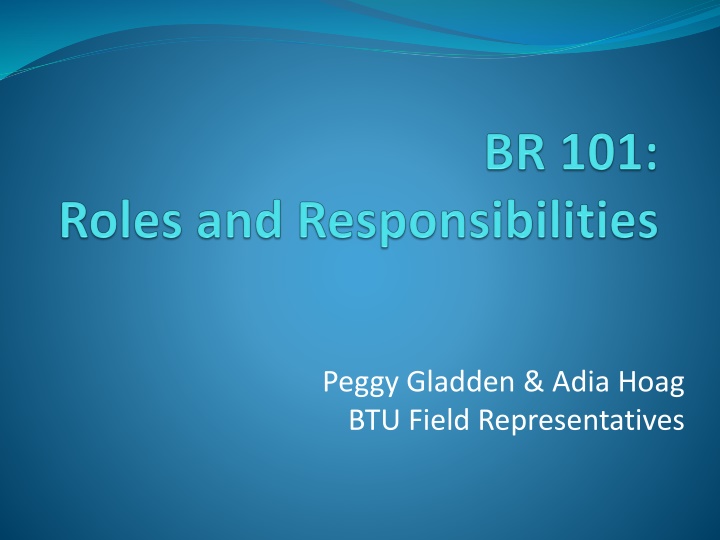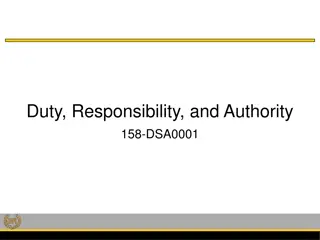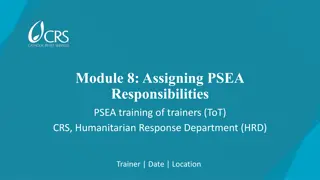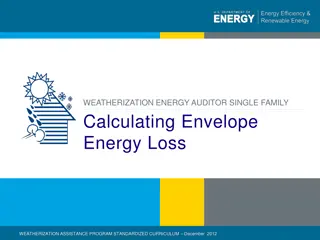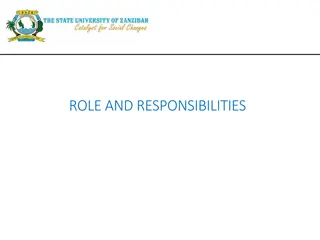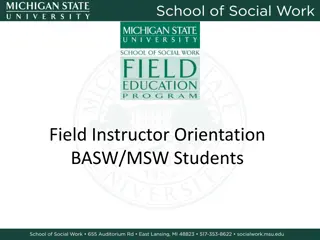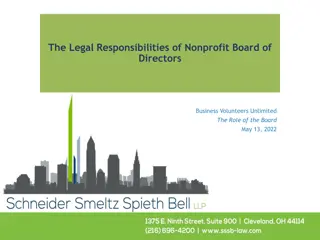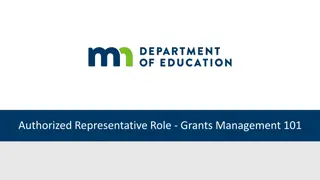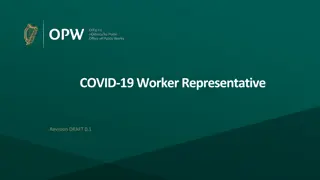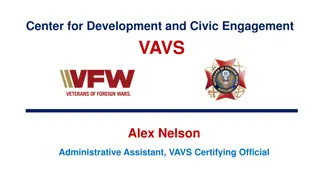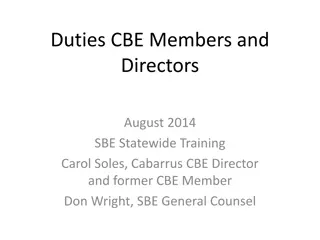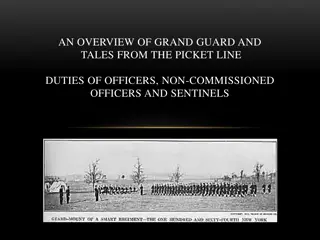Duties and Responsibilities of BTU Field Representatives
BTU Field Representatives play crucial roles as worksite leaders, communicators, problem solvers, and union builders. They represent the school, distribute information, resolve issues, and promote union activities. Grievances are addressed through a defined process involving various levels of authority. Effective communication, problem-solving skills, and union building are key aspects of their responsibilities.
Download Presentation

Please find below an Image/Link to download the presentation.
The content on the website is provided AS IS for your information and personal use only. It may not be sold, licensed, or shared on other websites without obtaining consent from the author.If you encounter any issues during the download, it is possible that the publisher has removed the file from their server.
You are allowed to download the files provided on this website for personal or commercial use, subject to the condition that they are used lawfully. All files are the property of their respective owners.
The content on the website is provided AS IS for your information and personal use only. It may not be sold, licensed, or shared on other websites without obtaining consent from the author.
E N D
Presentation Transcript
Peggy Gladden & Adia Hoag BTU Field Representatives
The Core Responsibilities The Work Site Leader The Communicator The Problem Solver The Union Builder
The Worksite Leader Represents the school at building representative meetings Gets union members to serve on committees Is a visible representative of the union Holds worksite meetings Welcomes new employees Discusses important issues
The Communicator Distributes newsletters and flyers Reports back information to members Maintains a bulletin board Collects literature & bulletins from opposition Informs faculty of policy decisions Activates a building telephone tree or email list Conducts surveys
The Problem Solver Handles lower level informal grievances Maintains contact with BTU staff regarding concerns Indentifies worksite problems Involves members in professional issues
The Union Builder Develops a Union Chapter Committee Recruits members Secures support for legislative activities Organizes social events Recruits volunteers for political campaigns
What is a Grievance? Article IV 4.2 Definition A grievance is a violation, misapplication or misinterpretation of any provision of this agreement or of a policy of the Board of School Commissioners which affects the terms and conditions of employment.
The Grievance Process Step 1: School Site or Office Step 2: Appropriate Executive Director or Designee Step 3: CEO or Designee Step 4: Board of School Commissioners Step 5: Arbitration
Step 1 School or Office An employee shall present his complaint orally to the appropriate administrator, within ten (10) school days after knowledge by the employee of the facts giving rise to the act or condition which is the basis of the complaint. The employee, or his representative, and the administrator shall confer with the view of arriving at a mutually satisfactory resolution. All matters, whether or not they meet the definition of a grievance as defined in Section 4.2, may be discussed at this stage. The administrator shall render a written decision which shall be communicated to the employee or Union representative within five (5) school days of the conference. Only grievances as defined in Section 4.2 may be pursued to Step 2.
Step 2: Executive Director If the dispute is not resolved at Step 1, the grievant may appeal by forwarding in writing to the Executive Director of Elementary/Middle or Secondary School, as appropriate, or next appropriate supervisor, in writing within five (5) school days after he has received the Step 1 decision. The Step 2 administrator shall schedule a meeting with the parties concerned within seven (7) school days of the receipt of the appeal at which time the aggrieved employee shall be afforded an opportunity to be heard. The Step 2 administrator shall issue a written decision within five (5) school days after the meeting.
Step 3: CEO The Step 2 decision may be appealed in writing to the CEO within five (5) school days after the Step 2 decision has been received. The CEO, or his designated representative shall meet with the aggrieved employee within ten (10) school days of the appeal. The aggrieved employee will receive at least two (2) school days notice of the meeting and shall be afforded an opportunity to be heard. The CEO, or his designated representative, shall communicate his written decision to the aggrieved employee not later than ten (10) school days after the meeting.
Step 4: Board of School Commissioners The Step 3 decision may be appealed in writing to the Board within five (5) school days after the Step 3 decision has been received. The Board, sitting as a whole, by committee, or by designee, shall hear the grievance within fifteen (15) school days following receipt of the appeal and shall render its decision not later than ten (10) school days following said hearing. The Board, at its option, may waive Step 4, in which case the Union may press the matter to arbitration.
Step 5: Arbitration Within ten (10) days following receipt of the Step 4 decision, the union may move any unresolved grievance to arbitration by notifying the Board in writing of its intention to do so. Thereafter either party may request the Federal Mediation and Conciliation Service to provide a list of seven (7) arbitrators who each are members of the National Academy of Arbitrators, FMCS Maryland Sub-Regional or Regional Area. An arbitrator shall be chosen by alternately striking names from the list, with the last name remaining being the arbitrator chosen. The decision of the arbitrator shall be final and binding on all parties to the arbitration. The arbitrator shall be without power to add to, subtract from, change or alter any provision of the Agreement, Board Policy or of applicable State or local law. The Arbitrator shall confine himself to the precise issue submitted for arbitration and shall have no authority to determine any other issues nor shall he submit observations or declarations of opinion which are not essential in reaching the determination. The arbitrator shall not hear or decide more than one (1) grievance unless mutually agreed otherwise. The cost for the services of the arbitrator, including per diem expenses, if any, and actual and necessary travel and subsistence expenses, will be borne equally by the Board and the Union.
Networking In School Network Ideas Assign several names to each of your most reliable people Divide the faculty by prep periods, floors, wings, etc Use this system to send out reminders out about meetings, voting, and passing on important information Phone Tree Messages arrive faster when no one person has to make more than 3 to 5 calls Use reliable staff members who can report back results A good phone tree works in both directions
School Meetings Keep them relevant, purposeful and worthwhile Make sure they reflect the opinions of the members The meeting should be held at a regular and convenient time Give advanced notice Allow questions and if you don t know, say so, and get back to your members with answers Provide an agenda and key items to be considered Include a social dimension (like coffee or a light snack) Promote a discussion, adds stimulation and is vital to decision making After the meeting follow up with non- union members present and make sure they are asked to join Ask for suggestions from new members and others on topics for the next meeting Help members relax by providing a relaxed and congenial atmosphere Make the meeting short and make sure it ends on time
Union Chapter Committees The UCC and the principal are to meet once a month, as stipulated in the contract Meetings help formulate school policy and contribute to the prevention of grievances This is a valuable tool in getting teachers and PSRPs voices heard on school matters Awkwardness can be dissipated if meetings are conducted properly; the intention is that the UCC and the principal sit down as equals to discuss school issues The UCC should have an agenda prepared and a strategy before you meet with your principal; decide to start with easier items first or difficult items first Establish and maintain a good rapport Propose and discuss solutions that are practical With time your principal will be convinced that your cooperation in solving problems at the school level will be an asset Inform staff members of the results of each meeting. THIS IS IMPORTANT! Do not give up!
Bulletin Boards For BTU information and important announcements Keep your bulletin board attractive and up-to-date Old poster and messages should be removed promptly All material should be kept fresh A quick glance by a colleague will show them that BTU is fighting for them!
Recruiting BTU Membership Drive Form a leadership team Target non-members Contact non-members Follow-up
Forming a Leadership Team The Building Rep can t do everything. The activism of all union members is essential. Volunteers are needed. Membership recruitment is an on-going process. The regularity of membership recruitment meetings determines to a large degree the success of membership recruitment.
Reaching Out to Non-members You may wish to invite a BTU staff person to talk with your total staff or individual non- members Mass Action Approach: BR must actively seek the participatio n of every person at school Swift and prompt handling of grievances builds membership. The Buddy System: a BTU member is assigned to welcome each new member and inform new members about the benefits of joining the BTU BRs should keep a supply of Membership Cards on hand If you don t ask, they won t join!
Follow Up Don t believe them when they say no; today s NO could be tomorrow s active member People will often say no because its easy or because they don t know much about the union Getting people to join is an educational process Keep going back Convince them they have a contribution to make and that you really want them with you
Lay the Groundwork In school Contact Network Phone Tree Have Meetings Involve People Establish Important Relationships Attend Every Building Representative Meeting Encourage Attendance at Every Membership Meeting
Remember, even though the BTU has one of the toughest contracts in the country, no contract is worth the paper it s printed on unless it s enforced.
